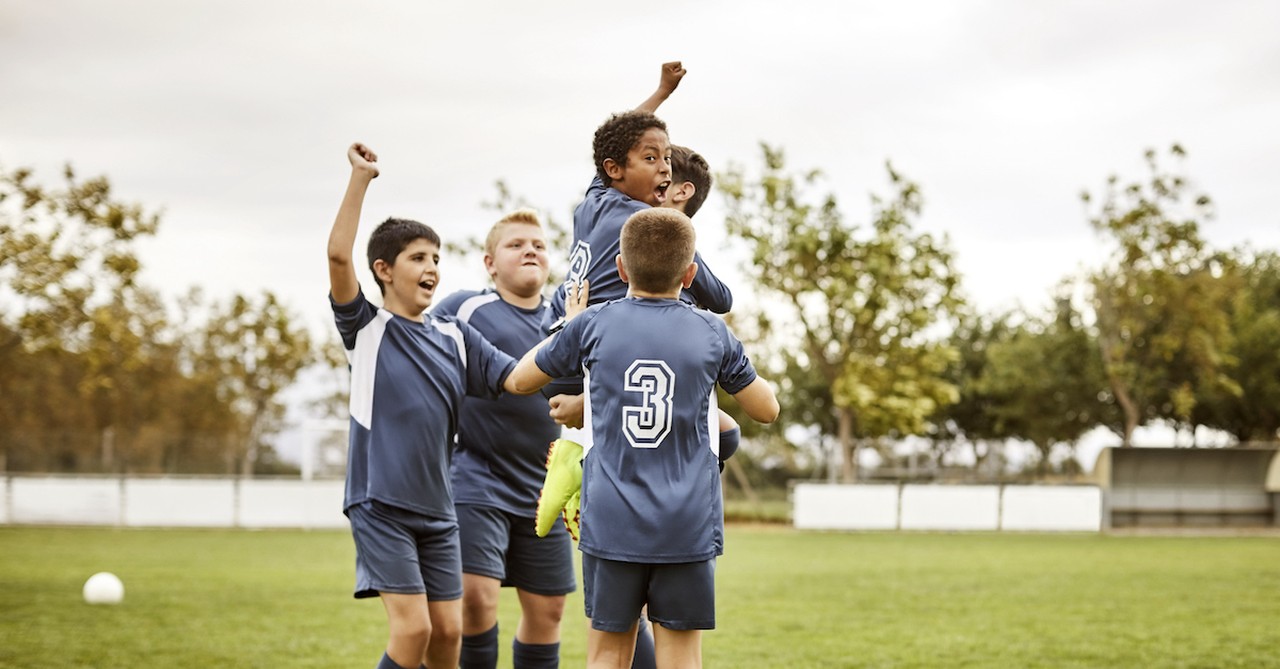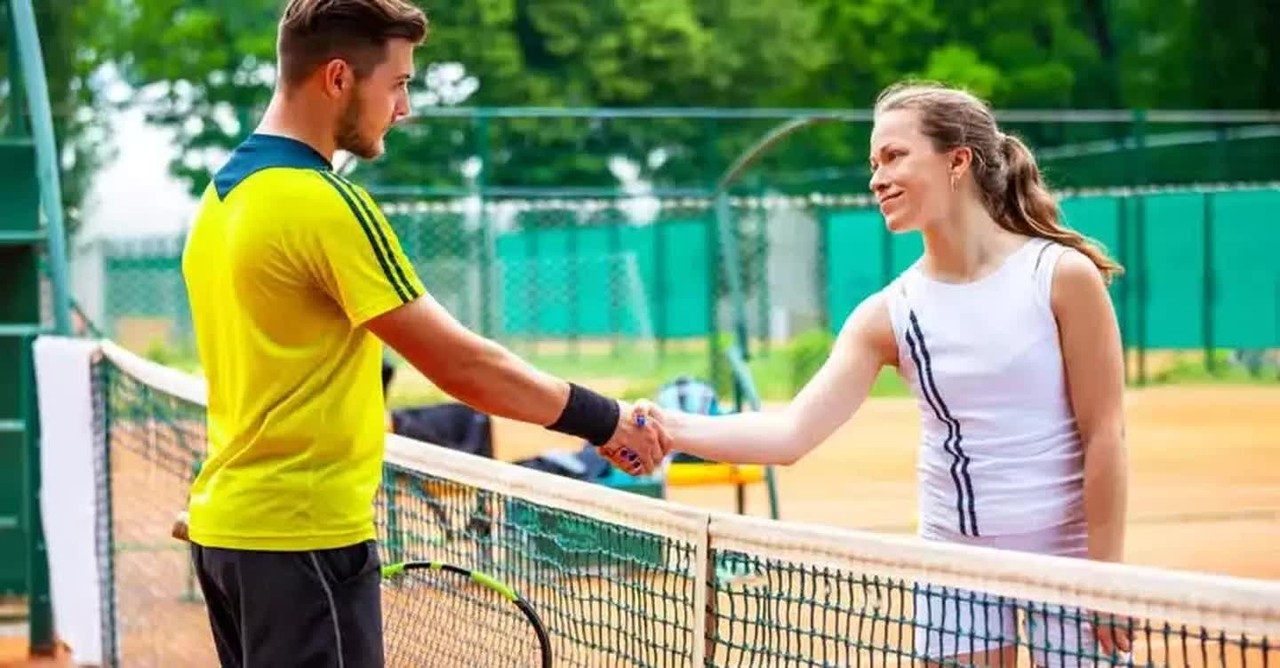5 Ways to Teach Your Kids Good Sportsmanship

As our kids engage in sports, their skills improve, but equally important, we want to develop their character in the process. Sports provide a platform for kids to exercise the fruits of the spirit. You may not think of sports when considering the fruits of the spirit, but it’s love for others, exhibiting kindness when interacting with others, learning patience and joy, and displaying self-control.
Sportsmanship is treating others with respect and demonstrating appropriate behavior while involved in sports. This includes how you interact with your teammates, the opponents, coaches, parents, and the referees.
Watching kids display good sportsmanship is encouraging, such as observing a kid help an opposing team member up off the ground. Or when a kid assists an injured player to the sideline. Kids exhibit good sportsmanship when they display respect and tactfulness to their teammates and opponents.
On the other hand, I don’t think anyone likes watching the out-of-control player. The one who is emotionally charged, and you are just praying no one gets hurt. Their anger and frustration are uncontrolled and fueled by passion. Then there is the kid who cannot handle losing and pouts off the field not engaging with his team nor acknowledging the opponents.
It’s easy to spot good and poor sportsmanship on the court or field, but how do we teach our kids to show good sportsmanship?
Photo Credit: ©GettyImages/Morsa Images
1. Losing with Grace

1. Losing with Grace
SLIDE 1 OF 5
Although the goal in sports is to win, there will be losses along the way; it’s part of the journey. Some kids are more competitive than others, but in general, it’s not fun to lose, and some can have an especially hard time learning how to do this well.
There is a large scale for how this looks. We have all seen the kid who acts up, yelling or becoming overly aggressive, talking smack to the other team. Their emotions are a catalyst for their frustrations, and they lack self-control. We must teach every opportunity we have to help our kids continue to evolve and mature. This includes learning how to lose with grace.
While it’s important to keep a positive attitude and continue forward, losing gives you a chance to reflect on your game and decide what things you must improve for next time. It also can be motivating; you get to dig deep and come back stronger next time.
Losing provides opportunities to build resilience, a skill we must learn in life. How do you teach this; you practice it. After the loss, you take a short period to process and mourn the loss, and then you shake it off and focus on the next challenge ahead.
Every loss and challenge is a learning opportunity. Guide and show your child how to win and lose with class. Encourage them to keep their head up after the game to reassure their teammates they fought well. Remind them to thank their coaches and look the opponents in the eye when you go through the line shaking their hand. Go out in style. If this doesn’t come naturally, practice it until it does.
Photo Credit: ©Getty Images/piranka
2. Exhibiting a Positive Attitude

2. Exhibiting a Positive Attitude
SLIDE 2 OF 5
“Life is 10% what happens to you and 90% how you react to it.” Charles R. Swindoll wrote an entire book based on this idea. Attitude gets you far in sports and in life. Anyone can find things to grumble about, it’s the people who look beyond and keep going who are the ones with the advantage.
We want our kids to be the player with a positive attitude who supports their teammates. To coach our kids in sportsmanship, we must help them keep a positive mindset. This is easier said than done, but it starts at home with how we react to situations. If we model an optimistic attitude when challenges are thrown our way, they will observe how mom and dad handle situations and learn from those examples.
Some kids are going to be naturally more positive than others, but I believe this is something that can be learned. If they are struggling, have them call out five things to be grateful for. If they are down on themselves, have them identify five actions they did well in the game. Focus on the positives. When you start finding gratitude, positive energy will follow.
I just finished an unbelievable book by Alfred Lansing called Endurance. This book tells the story of William Shackleton and his expedition to Antarctica in 1914. One of my takeaways was Shackleton’s (and most of the crew's) optimistic attitude. If they gave up hope and gave into despair, they would have died. In fact, Shackleton made significant strategic decisions based on people’s attitudes, he knew a negative attitude could spread and be fatal.
Attitude is almost everything, so how do we cultivate this?
Photo Credit: ©GettyImages/skynesher
3. Affirm the Positive Actions

3. Affirm the Positive Actions
SLIDE 3 OF 5
I remember reading parenting books when our kids were toddlers. They spoke a lot about affirming the behavior you want to see repeated. When kids do something right, draw attention to it, and acknowledge their good choices.
This doesn’t stop when they are older, the message just shifts. When you see them exhibiting good sportsmanship on the field or off, praise them. “I like how you handled yourself in that situation today.” “That was a tough call, but I appreciate how you kept your head in the game and remained focused.” “You showed good leadership when you encouraged your teammates on the field.” You get the idea.
Recognize when they display kindness or self-control. It will encourage them to continue down the path of good decision-making on and off the field. When they do something nice for a teammate, make a big deal. Explain it’s the little things that make a big impression on people.
Your attitude will reflect on your children’s. If you emphasize what went wrong in the game, so will they. If the team lost, grab at the things that went well, such as how a situation was handled. Highlight the effort, not the result! If they gave it their all, then they did the best they could. Help them identify their progress.
Encourage your kids. They are probably harder on themselves than you think. They will most likely beat themselves up over their mistakes, don’t jump on the wagon, help them out. Cheer them up, and remind them of the big picture.
Photo Credit: ©GettyImages/luckyraccoon
4. Learning from Mistakes

4. Learning from Mistakes
SLIDE 4 OF 5
The number one impediment to success is fear of failure. Kids are afraid to make mistakes; to fail. If we can shift their mindset that messing up isn’t failing, it’s how we learn, we can free them of the unnecessary weight they carry around.
Mistakes are growth opportunities. We learn from our errors. No one enjoys losing or making an error, but it can motivate us to do better next time.
Remind your child they are not perfect, nor will they ever be. Jesus was the only perfect human on this earth. He fulfilled that role, now we get to walk in the freedom He created.
God gave us gifts and talents; we get to develop them. We can’t cultivate them if we are overly anxious and focused on never messing up. Focus on progress, the individual development. An athlete should not be competing against their teammate or rival, they should be measuring their individual growth. Have they improved over the course of the season? Are they better than last year?
My daughter got a technical foul this basketball season. There was some aggressive play on the court. After a while, she was pushed and fell to the ground. As she came up, she threw the ball. She wasn’t throwing it at anyone, just releasing all that pent-up frustration. The referee didn’t like this action and she got a technical. While this was a difficult experience for her, I can tell you her foul count went way down after that game, and she exhibited much more self-control the rest of the season.
When kids can accept that making mistakes is part of the journey, they can share that mindset with their teammates. Then you have a group of kids with an open mindset to learn, and less focused on never messing up.
Photo Credit: ©iStock/Getty Images Plus/mixetto
5. Keep a Kingdom Mindset

5. Keep a Kingdom Mindset
SLIDE 5 OF 5
We are here to glorify God. When you keep your eyes focused on Him, the Perfector of our faith, and remember the big picture, it helps keep things in perspective.
Kids get excited and invested in the game, and parents do the same. It’s hard to keep a clear mind amid the excitement. We must remember we are ultimately on Christ’s team. God has given us guidelines in the Bible to direct our journey. We must ask for His help to do our best in honoring Him in all we do.
The goal is to exhibit virtues in all our endeavors. We practice the virtues here and now, preparing for our heavenly home. Being a toddler is preparation for evolving into a big kid, kids prepare for the teenage years, teenagers are preparing for adulthood all while growing in our faith and knowledge of Him. He sanctifies us along the journey. He uses everything we do as learning opportunities, sports included. “He who began a good work in you will carry it on to completion until the day of Christ Jesus” (Philippians 1:6).
Sports are an avenue to grow in perseverance, honesty, kindness, temperance, love, fortitude, gratitude, strength, and more. Use sports as a platform for your kids to grow and mature.
Having a kingdom mindset means remembering Who created you and why. Practice showing gratitude for everything: the referees, your parents, the fans, the facility, your team, and your coach. Being thankful is a great way to humble ourselves and remember how small we are in His great creation.
Teaching good sportsmanship lays the groundwork for our kids to become good people.
As we teach them good sportsmanship and to be good team players, it helps prepare them to be disciples of Christ.
Photo Credit: ©Getty Images/Jacob Lund

Originally published April 01, 2024.









